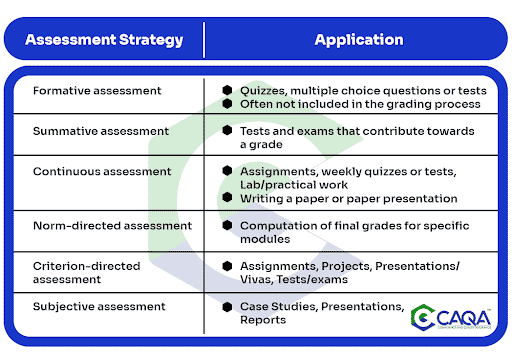There are many different assessment strategies that training organisations can use to evaluate their students’ progress. Some of the most common types of assessment include formative assessment, summative assessment, continuous assessment, norm-directed assessment, criterion-directed assessment and subjective assessment. Each type of assessment has its own advantages and disadvantages, so it is important to choose the right strategy for your organisation’s needs.

Formative assessment is a great way to provide feedback to students on their progress. It can be used to identify areas where students need improvement and to help them focus on those areas. Formative assessment is a great way to assess learning progress on an ongoing basis. It can help identify areas where students need more support and allows instructors to adjust their teaching methods accordingly. However, formative assessment can be time-consuming, and may not always produce reliable results.
Summative assessment, on the other hand, is more focused on determining whether or not a student has mastered a particular skill or concept. Summative assessment is typically used to evaluate learning at the end of a course or program. It can be used to assess overall performance or to identify areas where students need improvement. Summative assessment is generally more reliable than formative assessment, but it can be more expensive and time-consuming to administer.
Continuous assessment is a process whereby students are assessed regularly throughout the course of their studies, rather than just at the end. This allows for a more accurate picture of student progress. Continuous assessment is a hybrid approach that combines elements of both formative and summative assessment. It allows for ongoing evaluation of learning progress, while still providing a comprehensive overview at the end of a course or program. Continuous assessment can be an effective way to assess student learning, but it requires careful planning and execution to be successful.
Norm-directed assessment is used to compare students against each other, in order to identify areas of strengths and weaknesses. Norm-directed assessment is a type of assessment that compares students against predetermined standards. This approach can be used to evaluate overall performance or to identify areas where students need improvement. Norm-directed assessment is generally reliable, but it can be expensive and time-consuming to administer.
The criterion-directed assessment focuses on specific criteria that must be met in order for a student to be considered proficient. Criterion-directed assessment is a type of assessment that compares students against each other, rather than against predetermined standards. This approach can be used to evaluate overall performance or to identify areas where students need improvement. Criterion-directed assessment is generally reliable, but it can be expensive and time-consuming to administer.
Subjective assessment relies on the opinions of those carrying out the assessment, rather than on objective measures. Subjective assessment is a type of assessment that relies on the opinions of instructors or other experts. This approach can be used to evaluate overall performance or to identify areas where students need improvement. Subjective assessment is generally less reliable than other approaches, but it can be less expensive and time-consuming to administer.
Each type of assessment has its own benefits and drawbacks, so it is important to choose the right strategy for your organisation’s needs. Formative assessment can be time-consuming and may not always give a clear indication of student progress. Summative assessment can be more reliable, but may not provide detailed feedback. Continuous assessment is a good compromise between the two but may be difficult to implement in some organisations. Norm-directed and criterion-directed assessments can be useful for identifying areas of weakness but may be biased if not carried out properly. Subjective assessment is prone to errors but can give a more complete picture of a student’s ability.
Whichever type of assessment you choose, it is important to make sure that it is aligned with the learning objectives of the course, as well as the organisation’s own goals and values. By doing so, you can ensure that your students are getting the most out of their learning experience and that they are able to meet your organisation’s standards.




